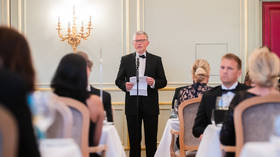From Nazi controversy to attacking the chancellor: A look back at the turbulent tenure of Ukraine’s man in Germany

Ukrainian President Volodymyr Zelensky relieved diplomat Andrey Melnik of his post on Saturday.
While neither his potential successor nor the future fate of the now ex-envoy are currently known, media reports have suggested the controversial emissary might end up being promoted and assume the post of deputy foreign minister in Kiev.
Melnik was elevated to the position of ambassador to Germany for post-Maidan Ukraine in December 2014, succeeding Russian-born Pavel Klimkin in that role. For the latter, the post became a stepping stone to the position of Ukraine’s foreign minister under then-President Petro Poroshenko.
The envoy quickly became the subject of assorted controversies, with the past few months in office particularly scandalous for Melnik over his questionable ways of rallying support for Kiev amid the ongoing conflict with Russia.
Commemorating Nazi collaborator Bandera
Shortly after assuming the post of ambassador, Melnik became embroiled in his first major scandal after he visited the grave of Stepan Bandera – a hardcore Ukrainian nationalist who collaborated with the Nazis during WWII and is deemed to be a national hero in present-day Ukraine.
Почав свій візит до Мюнхена із покладання разом з громадою квітів і панахиди на могилі Героя України Степана Бандери pic.twitter.com/q5ShYDandu
— Andrij Melnyk (@MelnykAndrij) April 27, 2015
“Began my visit to Munich by laying flowers together with the community, and [partaking in] a memorial service at the grave of the Hero of Ukraine Stepan Bandera,” Melnik tweeted.
Blasting ‘sloppy’ German military aid
Since fighting between Kiev and Moscow broke out in late February, Melnik has repeatedly criticized the scale and pace of Berlin’s military aid. For instance, the diplomat posted a picture on social media of a snail with a rifle bullet taped to its shell, sarcastically captioning it “German help is already on its way to us.”
“Deutsche Waffen für die Ukraine bereits unterwegs” 🤦♂️Gerade von einem Regierungsmitglied aus Kyjiw per whatsapp zugeschickt bekommen. Tja. Russland darf den Krieg nicht gewinnen pic.twitter.com/giDldA20tv
— Andrij Melnyk (@MelnykAndrij) May 25, 2022
‘Offended liverwurst’
Arguably the most high-profile scandal was sparked by Melnik in May, when he described German Chancellor Olaf Scholz as an “offended liverwurst” over his refusal to pay a visit to Kiev. Scholz’s move stemmed from Kiev’s own refusal to host German President Frank-Walter Steinmeier in mid-April, over his allegedly cozy ties with Russia.
While Melnik had repeatedly defended his remark and insisted it was “not a matter of apologizing,” he admitted in late June that he ultimately “regretted” the offensive statement and promised to apologize to Scholz personally.
Denouncing leading German intellectuals
In late June, Melnik launched a vicious assault on a group of leading German intellectuals, who penned an open letter advocating the end of arms deliveries to Ukraine and urging the West to make Kiev negotiate peace.
“What a bunch of pseudo-intellectual loosers (sic),” Melnik tweeted, listing some of the intellectuals by name and suggesting they “should go to hell with [their] defeatist advice.”
Nicht schon wieder, what a bunch of pseudo-intellectual loosers 🤦♂️Ihr alle Varwicks, Vads, Kluges, Prechts, Yogeshwars, Zehs & Co. sollt euch endlich mit euren defätistischen „Ratschlägen“ zum Teufel scheren. Tschüßhttps://t.co/maeCCkxrBUpic.twitter.com/R6W19c66om
— Andrij Melnyk (@MelnykAndrij) June 29, 2022
More Bandera whitewashing
The most recent scandal in which Melnik became entangled, rather ironically, turned out to be again related to the controversial Ukrainian national ‘hero’. During an interview with German podcaster Tilo Jung, the diplomat repeatedly defended Bandera, presenting him as a universally revered Robin Hood-like figure.
He also claimed that Bandera was not implicated in the mass murder of Jews and Poles, prompting criticism from both Poland and Israel. The fallout from his interview turned to be so bad that Ukraine’s Foreign Ministry had to step in to explain that the remarks did not represent Kiev’s official stance.












